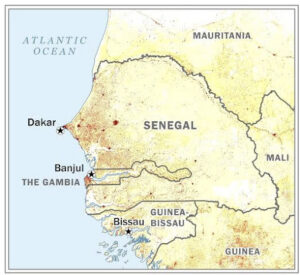In news- Ministers of the Gambia, Guinea Bissau, Mauritania and Senegal signed a joint declaration recently to advance transboundary cooperation in the Senegal-Mauritanian Aquifer Basin (SMAB).
More information-
- The four West African countries have, through the declaration, agreed to establish a legal and institutional framework for cooperation on SMAB.
- It is in line with the United Nations Economic Commission for Europe (UNECE) Water Convention.
- The SMAB is the largest basin in the Atlantic margin of north-west Africa, having an area of 350,000 square kilometres.
- More than 24 million inhabitants of the region are dependent on it for drinking water and other needs.
- Some 80 per cent of the populations of the four countries that have signed the declaration, depend on the SMAB.

- In the 9th session of the Meeting of Parties (MOP9) to the UNECE Water Convention, the declaration was signed.
- Senegal, upon accession to the UNECE Water Convention in 2018, had requested for such a declaration.
About UNECE-
- The United Nations Economic Commission for Europe (ECE or UNECE) is one of the five regional commissions under the jurisdiction of the United Nations Economic and Social Council.
- It was established in order to promote economic cooperation and integrations among its member States.
- It was formed on 28 March 1947.
- It is Headquartered in Geneva, Switzerland.
- The commission is composed of 56 member States, most of which are based in Europe, as well as a few outside of Europe.
- Its transcontinental Eurasian and non-European member States include: Armenia, Azerbaijan, Canada, Georgia, Israel, Kazakhstan, Kyrgyzstan, the Russian Federation, Tajikistan, Turkmenistan, the USA and Uzbekistan.
About Water Convention-
- The Convention on the Protection and Use of Transboundary Watercourses and International Lakes (Water Convention) is a unique international legal instrument and intergovernmental platform which aims to ensure the sustainable use of transboundary water resources by facilitating cooperation.
- Initially negotiated as a regional instrument, it has been opened up for accession to all UN Member States in 2016.
















